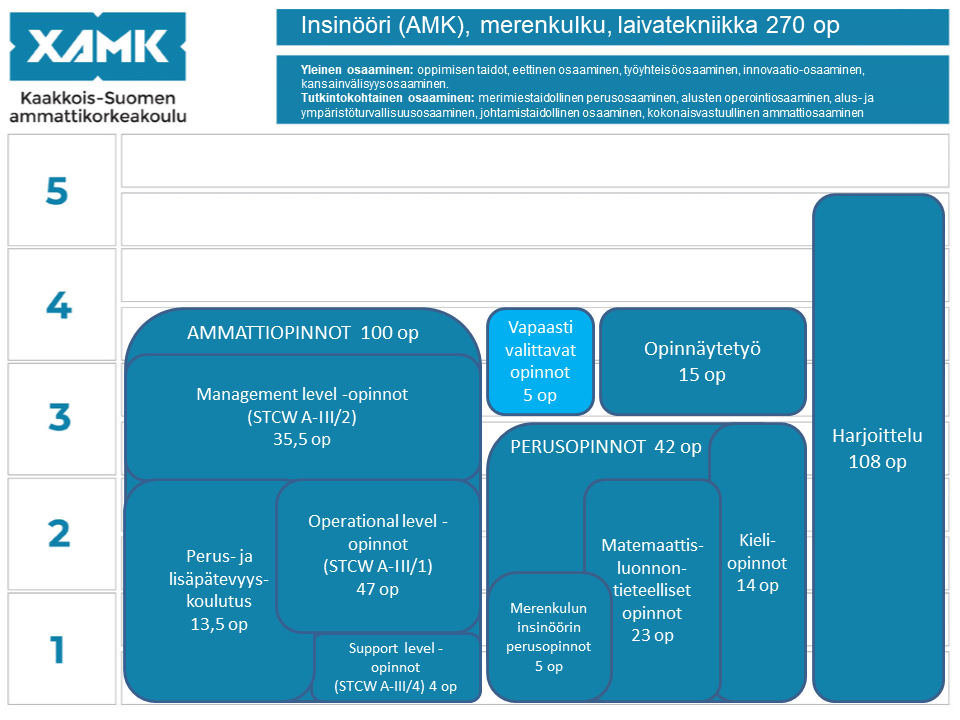Degree Programme in Marine Engineering, Ship Technology
- Degree
- Bachelor of Engineering
- Degree title
- Insinööri (AMK), Bachelor of Engineering
- Credits
- 270 ects
Objectives
Merenkulun opinnoissa tutustut laivan koneistoihin ja järjestelmiin sekä kone-, sähkö- ja automaatiotekniikkaan. Teoriaopintoja sovellat käytäntöön simulaatioharjoituksissa sekä koulualuksella ja kauppalaivoilla suoritettavissa tehtävissä. Harjoittelut sinulla on mahdollisuus suorittaa kansainvälisillä merireiteillä. Voit myös hankkia maavoimalaitospätevyyden valitsemalla opintoja energiatekniikan koulutuksesta tai laajentaa osaamistasi muilla tekniikan, merenkulun ja logistiikan opinnoilla.
Teoriaosaamistasi täydentävät tiedot aluksen huolto- ja kunnossapitomenetelmistä, laivan rakenteista sekä merimiestaidot, joihin sisältyvät laajat ensiapu-, turvallisuus- ja hätätilannevalmiudet.
Tärkeä osa merenkulun insinööritutkintoa ovat laajat kieliopinnot ja hyvät kommunikaatiotaidot, sillä kansainvälinen kanssakäyminen eri yhteyksissä kuuluu alan arkipäivään. Merenkulkijana hyvää kielitaitoa, erityisesti englannin kielen taitoa, edellyttävät monet merenkulkuun liittyvät säädökset, tekniset asiakirjat sekä käyttö- ja huolto-ohjekirjat.
Xamkissa merenkulun koulutuksen vahvuuksia ovat turvallisuuteen ja alusten käyttötekniikkaan liittyvä osaaminen sekä uraauurtava meriympäristönsuojelun asiantuntemus.
Degree programme description
Koulutuksen laajuus on 270 opintopistettä (op)
Merenkulun insinööriopintojen rakenne:
• perusopinnot 36 op
• ammattiopinnot 106 op
• vapaasti valittavat opinnot 5 op
• ohjattu harjoittelu 108 op
• opinnäytetyö 15 op
Merenkulun insinöörikoulutus jakautuu kolmeen eri tasoon: support-, operational- ja management-tasoihin. Support-tasolla saat valmiudet toimia aluksen käytännön tehtävissä miehistötasolla. Operational-tason koulutus valmistaa sinut työskentelemään alemmissa päällystötehtävissä, ja Management-tason suoritettuasi sinulla on teoreettiset valmiudet toimia kansainvälisen liikenteen ylimmissä päällystötehtävissä.
Laajat kieliopinnot ja hyvät kommunikaatiotaidot ovat tärkeä osa koulutusta: kansainvälinen kanssakäyminen eri yhteyksissä kuuluu alan arkipäivään. Hyvää kielitaitoa, erityisesti hyvää englannin kielen taitoa edellyttävät monet merenkulkuun liittyvät asiat muun muassa
• säädökset
• tekniset asiakirjat
• käyttö- ja huolto-ohjekirjat.
Ensimmäisenä vuotena suoritat perustason turvallisuuskoulutuksen ja miehistötason opinnot saadaksesi valmiudet ohjattuun laivaharjoitteluun. Toisen ja osittain kolmannen vuoden aikana suoritat vahtikonemestarin pätevyyteen oikeuttavat teoreettiset opinnot. Osa kolmannesta vuodesta ja viimeinen vuosi koostuvat pääosin merenkulun johtamistason opinnoista sekä opinnäytetyöstä.
Lisäksi tutkinnon ylittävinä opintoina suoritettavat maavoimalaitosten käytönvalvojan opinnot mahdollistavat toimimisen maavoimalaitoksissa. Merenkulun insinöörin opinnot kestävät yhteensä 4,5 vuotta.
Koulutukseen hyväksyttävän on osoitettava todistus terveydentilastaan.

Implementation of studies
Merenkulun insinöörin opinnot toteutetaan päiväopintoina, ja ne sisältävät teoriaopintoja, käytännön harjoituksia ja simulaattorissa suoritettavia harjoituksia. Tämän lisäksi opinnot sisältävät paljon käytännön harjoittelua laivalla ja mahdollisesti maaorganisaatioissa. Saat opiskeltaviin asioihin perusteet teoriaopintojen aikana. Pääset toteuttamaan ja harjoittelemaan perusteiden hallintaa koululaivalla, simulaattoriympäristössä ja harjoittelujaksoilla kauppa-aluksilla.
Opetus tarjotaan pääasiassa Xamkin Kotkan kampuksella. Opinnot sisältävät useita pitkiä harjoittelujaksoja kauppa-aluksilla. Yhteensä tutkinto sisältää harjoittelua 360 päivää, josta korkeintaan puolet voi olla maapuolella tehtyä harjoittelua.
Opintojen ohjaus
Xamkissa tuetaan opiskelijoita kaikissa opiskeluun liittyvissä asioissa. Opiskelusi tukena ovat opiskelijavastaavat ja opiskelijatutorit, jotka ohjaavat muun muassa opiskeluympäristöjä ja opiskelukäytäntöjä koskevissa asioissa. Käytettävissäsi kampuksilla on myös opiskelijapalveluneuvojan, opiskelijakuraattorin, opintopsykologin ja opiskeluterveydenhuollon palvelut. Lue lisää opiskelijan hyvinvoinnista.
BYOD – Bring Your Own Device
Xamkin opiskelijoilta edellytetään omien päätelaitteiden (esim. kannettavien tietokoneiden) käyttöä. Lisätietoja löydät Xamkin verkkosivulta.
Career opportunities
Merenkulkuala tarjoaa kiinnostavia ja monipuolisia tehtäviä sekä mahdollisuuden kansainväliselle uralle osaavassa ja taitavassa laivayhteisössä. Koulutuksessa saat valmiudet konepäällystön johtotehtäviin eli vahtikonemestarin, konemestarin ja ylikonemestarin toimiin rajoittamattomassa liikenteessä. Insinööriksi valmistuttuasi voit sijoittua maailman meriliikenteeseen eri alustyypeille esimerkiksi rahti- ja säiliöaluksille sekä matkustajalaivoille ja -autolautoille.
Maaorganisaatioissa, kuten varustamoissa ja telakoilla, on muun muassa projektipäälliköiden, konetarkastajien sekä teknillisten johtajien tehtäviä.
Maavoimalaitospätevyyden hankkiessasi voit sijoittua myös voimalaitosten käyttötehtäviin.
Tehtävänimikkeitä voivat olla
• tekninen johtaja
• konetarkastaja
• projektipäällikkö (muu tekninen ala)
• konepäällikkö
• konemestari (laiva)
• ylikonemestari.
Pätevyys
Koulutus tähtää merenkulun insinööritutkintoon ja koulutuksen aikana hankittavaan vahtikonemestarin pätevyyskirjaan.
Koulutus täyttää kansainvälisen STCW-sopimuksen (Standards of Training, Certification, and Watchkeeping) vaatimukset. Pätevyystodistuksen saamisen edellytyksenä ovat STCW:n mukaiset hyväksytyt ammattikorkeakoulutasoiset opinnot ja ohjattu harjoittelu. Merenkulun koulutuksella on yleissopimuksen mukainen laatujärjestelmä.
Valtioneuvoston asetuksen mukaisesti vahtikonemestarinkirjan saamisen edellytyksenä on muun muassa vähintään 18 vuoden ikä, säännösten mukainen koulutus ja siihen liittyvä työharjoittelu.
RDI and cooperation with world of work
Xamkissa kehität asiantuntijuuttasi aidoissa työelämäyhteyksissä. Työelämän oppimisprojektit tehdään yhteistyössä opiskelijoiden, työelämän edustajien ja opettajien kanssa.
Opintojesi aikana voit olla mukana useissa työelämäläheisissä projekteissa, monesti myös usealle eri organisaatiolle. Opittavat tiedot, taidot ja asenteet kasvattavat osaamista, ja saat ensiarvoisen tärkeitä kontakteja ja yhteyksiä työelämään. Elinkeinoelämään tutustumisen lisäksi tiivis yhteistyö luo sinulle kontakteja alueen yrityksiin ja muihin sidosryhmiin jo opintojesi aikana.
Alueellista ja valtakunnallista yhteistyötä
Xamkin merenkulun yksikkö on merenkulkuun ja kuljetusosaamiseen ja alusten käyttötekniikkaan erikoistunut, koko maata palveleva yksikkö. Opetus toteutetaan kansainvälisessä toimintaympäristössä, osittain yhteistyössä alueen ja alan tutkimus- ja kehitysyhteisöjen, oppilaitosten sekä elinkeinoelämän kanssa. Opetusta järjestetään muun muassa yhteistyössä Kotka Maritime Centren kanssa.
Näyttöön perustuvaa toimintaa
Tutkimus-, kehitys- ja innovaatiohankkeissa (TKI) pääset mukaan monialaiseen yhteistyöhön alueen toimijoiden, korkeakoulun henkilöstön ja eri opiskelijatiimien kanssa. TKI:n ja opetuksen yhteistyö antaa sinulle kokemuksia käyttäjälähtöisistä kehittämistehtävistä, jotka kytkeytyvät alueellisiin, kansallisiin tai eurooppalaisiin yhteistyöverkostoihin.
Learning environments
Perinteisen luokkatilaopetuksen lisäksi merenkulun insinöörin koulutuksessa hyödynnetään tehokkaasti erilaisia oppimisympäristöjä. Käytännön harjoituksia tehdään esimerkiksi simulaattorikeskuksella konehuonesimulaattoreita hyödyntäen sekä kone- ja sähkölaboratorioissa. Monipuolisissa konehuonesimulaattoreissa pääset tutustumaan uusimpiin moottori- ja valvontateknologioihin sekä harjoittelemaan turvallista toimintaa ja johtamista poikkeavissa olosuhteissa. Kone- ja sähkölaboratorioissa harjoittelet huolto- ja kunnossapitotöitä oikeilla laitteilla ja järjestelmillä.
Tämän lisäksi opinnot sisältävät käytännönläheisiä harjoituksia. Esimerkiksi henkilökohtaista pelastautumista, pelastusveneiden käyttöä ja hätätilanteissa toimimista harjoitellaan näihin erikseen suunnitelluissa simulaatiotiloissa. Palontorjuntaa, savusukellusta ja sammutusryhmän johtamista harjoitellaan aitoja tilanteita simuloiden.
Opintoihin kuuluvat ohjatut harjoittelut aloitetaan jo ensimmäisenä vuonna koululaiva Katarinalla. Koululaivan autenttisessa oppimisympäristössä ja harjoitustilanteissa luodaan vahva perusosaaminen harjoitteluun erilaisilla kauppa-aluksilla maailmanlaajuisessa meriliikenteessä.
